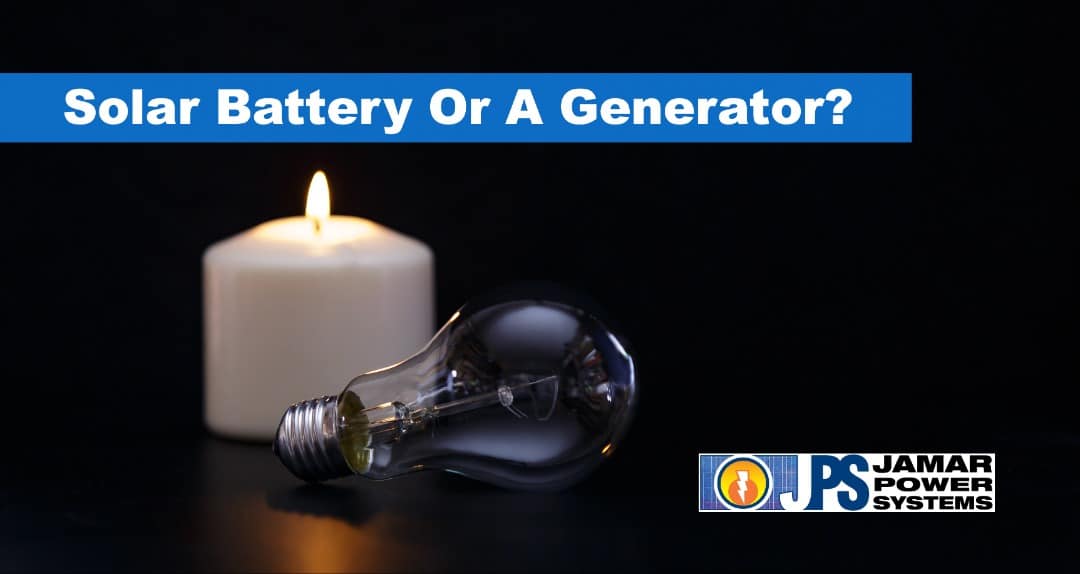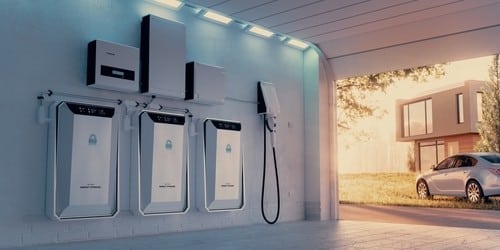Solar Battery or Generator for Emergency Backup Power?
Two popular options for emergency backup power are solar batteries and fuel generators.
In this article, we will compare the pros and cons of these two solutions, considering factors like pricing, maintenance, lifespan, warranty, ease of use, noise pollution, power source, fuel source, installation, capacity, and automation.
By the end, you’ll better understand which option might be the best fit for your needs.
Pros & Cons Of Fuel Generators
Higher cost fuel generators with auto-transfer switches offer immediate power availability during outages, making them a reliable solution for homeowners.
Their output and capacity can be sized to your household needs, allowing multiple appliances to be powered simultaneously.
Generators are compatible with existing electrical systems, eliminating the need for major modifications.
However, they come with some drawbacks. Fuel generators rely on a constant fuel supply, leading to ongoing expenses.
Also, generators, especially larger models, can be very noisy, causing noise pollution and complicating permit processing.
Regular maintenance is required to ensure their optimal performance, and their lifespan is generally limited, with potential wear and tear over time.
Lower cost fuel generators also lack automation features, requiring manual operation and connection.
Pros & Cons Of Solar Batteries
Solar batteries offer several advantages as an emergency backup power source for homeowners.
Stored solar battery electricity can serve your home not just during power outages but can also be used daily to save money by charging with utility power during off-peak times and then using that power duing peak rate hours.
Over the long term, solar batteries can lead to cost savings by reducing reliance on utility grids.
Maintenance requirements for solar batteries are minimal compared to fuel generators. They have a longer lifespan and are more durable.
Additionally, solar batteries have the potential for automation and integration with smart home systems, providing increased convenience with automated startup and control.
However, solar batteries do come with their own set of considerations. The initial upfront costs and installation expenses for solar battery systems can be higher.
If the battery is being charged by solar panels, then the availability of sunlight and weather conditions can also affect the performance of solar batteries.
Both fuel generators and most solar batteries can be stacked and scaled to any desired or required output size.
Is A Solar Battery Cheaper Than A Generator?
The cost is an important factor to consider when choosing an emergency backup power source.
Solar battery systems typically have higher upfront costs compared to fuel generators.
Installing a battery storage system requires an initial investment.
However, it’s important to note that solar batteries can provide long-term cost savings.
With potential reductions in utility bills and government incentives or tax credits available for solar battery installations, the payback period for solar batteries can be reasonable.
Comparison: Battery vs Generator
Analysis: Pricing, Maintenance, Lifespan, Warranty, Ease of Use, Noise Pollution, Power Source, Fuel Source, Installation, Capacity, and Automation.
Let’s dive deeper into the comparison between solar batteries and fuel generators based on various factors that homeowners should consider:
Pricing: Solar batteries have higher upfront costs than backup generators. On the other hand, fuel generators have lower initial costs, but ongoing fuel expenses can accumulate over time.
Maintenance: Solar batteries generally require minimal maintenance, primarily focused keeping them clean. On the other hand, fuel generators require regular maintenance, including oil changes, filter replacements, and fuel storage management.
Lifespan: Fuel generators can last up to 20 years or more with proper maintenance. Solar batteries have a limited lifespan, typically 10 to 15 years.
Warranty: Solar battery manufacturers often provide warranties ranging from 10 to 15 years. In contrast, fuel generators usually have shorter warranties, typically around 1 to 3 years.
Ease of Use: Fuel generators require a simple startup process. Solar batteries can provide seamless and automatic backup power once set up.
Noise Pollution: Fuel generators can be noisy, especially larger models. This noise pollution can concern homeowners, particularly in residential areas. Solar batteries produce no noise pollution.
Power Source: Fuel generators rely on traditional fossil fuel sources like gasoline, diesel, or propane. Solar batteries can either use renewable energy from the sun, making them a greener alternative, or can be charged with utility grid power.
Fuel Source: Fuel generators require a constant supply of fuel. Solar batteries can be setup to utilize free and abundant solar energy.
Installation: Installing solar panels and battery systems requires professional expertise and may involve structural modifications. Automatic fuel generators are complex installations requiring plumbing, electrical, noise barriers, plan & permit processing and inspections.
Capacity: Fuel generators generally provide higher power output and capacity, allowing multiple appliances to be powered simultaneously. Solar batteries have a more limited power output and capacity, making them suitable for powering essential appliances rather than the entire home during an outage. Though both systems can be setup to provide backup power for the entire household electricity usage if budget is not an issue.
Automation: Solar batteries can automate and integrate with smart home systems. This enables homeowners to remotely monitor and control their backup power and optimize energy usage. Fuel generators typically lack smart home automation features.
Conclusion
When choosing an emergency backup power source for your home, several factors must be considered.
Fuel generators offer immediate power availability, higher power output, and compatibility with existing electrical systems. However, they come with ongoing fuel expenses, noise pollution, and regular maintenance.
On the other hand, solar batteries provide environmentally friendly energy, long-term cost savings, minimal maintenance requirements, and potential automation features.
While they have higher upfront costs and limited power output, solar batteries offer a sustainable and reliable backup power solution.
The decision between a solar battery and a fuel generator ultimately depends on your specific needs, budget, and priorities.
A fuel generator might be the better choice if immediate power availability and higher capacity are crucial. However, if you prioritize sustainability, long-term cost savings, and ease of use, a solar battery system could be ideal for your home.
It’s essential to consult with professionals, such as solar installers or generator experts like ourselves, to assess your specific circumstances and determine the most suitable option. They can provide guidance on system sizing, installation requirements, and available incentives or financing options.
Remember, having a reliable backup power source is not only convenient but also crucial for ensuring the safety and comfort of your household during emergencies.
Make an informed decision that aligns with your energy goals and provides the peace of mind you need when facing unexpected power outages.
Note: The information provided in this article is for informational purposes only. It’s recommended to consult with professionals and conduct thorough research before deciding on emergency backup power sources.
Related articles:
2025 Federal tax credit changes for solar & solar batteries
Solar panel monitoring service
Battery storage system fundamentals
Peak Shaving: Invest in your home’s energy future for significant ROI
Why a battery makes financial sense with solar panels now under NEM 3.0
How long will a solar battery last during a power blackout?
How many batteries are needed to power your home?
How many years do solar batteries last?
Solar Battery or generator for emergency backup power?
How to check if your solar panels are charging the solar battery
Complete Guide to Solar PPA, Lease vs Buying Solar
How to choose a solar installer
Get a FREE solar anaylsis to see if solar energy or a battery is right for your home
- 2025 Federal Tax Credit Changes For Solar Panel Systems & Solar Batteries - July 8, 2025
- How Solar Batteries Work - March 4, 2024
- Solar Battery or Generator for Emergency Backup Power? - January 30, 2024







